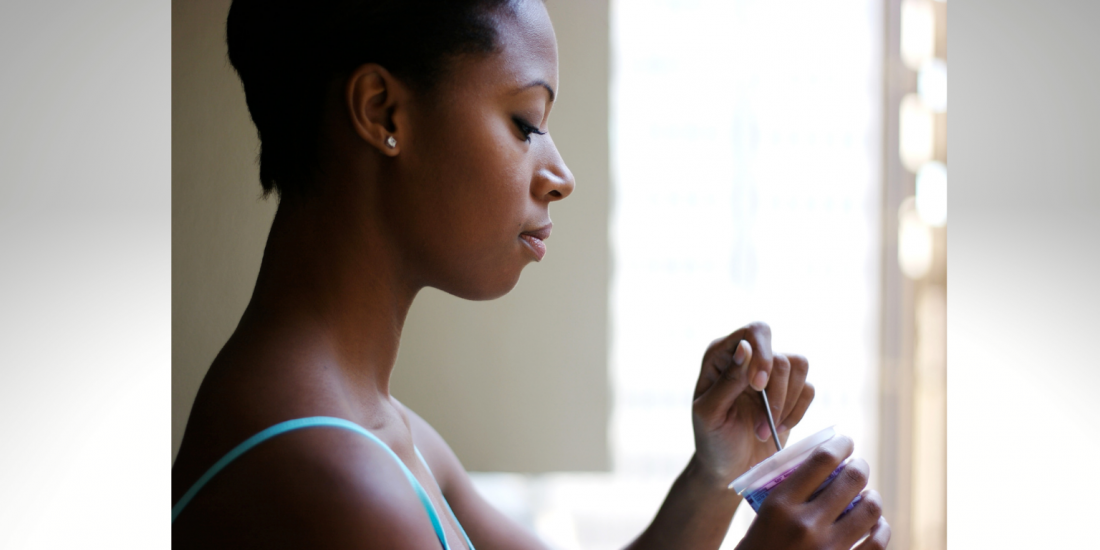We all know that the foods we eat affect every aspect of our lives, but did you know that what you consume also has a direct impact on your periods too? An expert dietician gives the lowdown on what foods we should be eating and when, to reduce PMS symptoms to have us feeling better than ever.

We all experience periods differently. Some lucky women experience no adverse symptoms at all, however, for many of us, our monthly periods can bring tiredness, bloating, breast tenderness, skin breakouts, cramps, mood swings and let’s not forget…hanger! You may be resigned to just stock up on your chocolates and other treats that help you get through the worse of symptoms, but what if we told you that what you eat and the exercises you do can help to reduce your PMS symptoms and leave you feeling better than ever?
We partnered with holistic dietitian Priscila Gonsalez, along with Intimina to educate you on what foods you should be eating during each phase of your menstrual cycle, as well as the amount of exercise you should be doing to take back control of your hormones once and for all.
Menstruation (Day 1-5)
During your period focus on foods that can boost your magnesium and iron levels, such as dark green leafy vegetables, nuts, seeds, seaweed, banana and dark chocolate. Foods rich in essential fatty acids, such as avocados, wild fish, cod liver oil from cod, hemp seeds and natto, and don’t forget to stay well hydrated.
Be sure to refuel and restore with teas, drink herbal tea or infusions of red raspberry leaves and nettle to help with menstrual cramps. To support your sleep, try chamomile or lemongrass. Avoid high impact exercises during your bleeding days and focus on yoga and light stretching. During your bleeding phase the body is working hard, which can cause fatigue – try to sleep early whenever possible. Massages just before the start of your cycle are also beneficial to help blood circulation.
Follicular Phase (Days 5-13)
Oestrogen and testosterone levels are going up. During this time, it is important to make sure that you are nourishing your body, so that your body can release an egg. Why is it important to release an egg even if you’re not trying to get pregnant? If the egg is not released, there is no adequate production of progesterone.
Progesterone deficiency causes various symptoms such as lack of menstruation, mood problems and also leads to oestrogen dominance. Focus on whole foods that don’t dramatically increase blood sugars. Replace simple carbs for wholemeal versions to reduce the increase in sugar in the blood. Incorporate fats and proteins into every meal. Regular meals and regular hours help to balance blood sugar levels.
Your energy will be at its peak during this phase, so if you are planning activities or vigorous exercise, this is the time to do them.
Ovulation (Days 14-16)
This phase usually occurs in the middle of your cycle and lasts only a week while the egg is released from the ovary and travels to the uterus. During ovulation, you may feel hotter than usual, because the body temperature rises by 0.5 degrees. If you are trying to get pregnant, this is the perfect time.
As the egg is released and travels through fallopian tubes, you may feel a little stiffness or pain around the hips, abdomen and lower back. Try yoga postures that will open your hips. Massage and acupressure can also help to relieve any stiffness. The best foods to eat during this phase is a mixture of cooked and raw foods, such as oats, nuts, seeds, potatoes, avocado, broccoli and raspberries.
Luteal and Premenstrual Phase (Days 17-28)
It’s important to increase your protein intake and health fats, in addition to heating food, because your body is getting ready to work hard during your bleeding days. Foods such as brown rice, roots, oily fish, pulses, avocado, ginger and turmeric are foods that will help your body during this phase. Avoid alcohol and caffeine during this phase, as they can increase menstrual symptoms and drain the body of the nutrients needed for the next phase of the cycle.
Light exercise is encouraged during this phase to help balance mood and hormones. You will naturally notice that your body wants to slow down and you will tend to feel more introverted. It is important to listen to your body cues and give yourself time to rest.
Priscila Gonsales: “Following a diet to optimise the four phases of your menstrual cycle is an important step for every woman, but it’s also important to just go with the flow, listen to your body and honour your cycle. You can focus on practices that can help regulate your cycle. When your body is connected to the fluctuations of nature’s rhythm, your cycle tends to be less painful and conception will be easier.”












